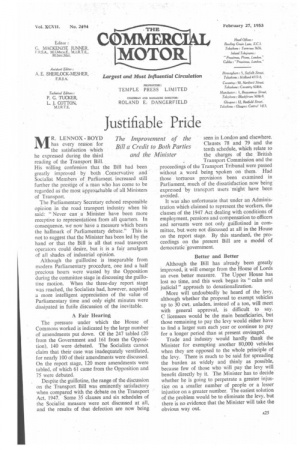Justifiable Pride
Page 27

If you've noticed an error in this article please click here to report it so we can fix it.
MR. LENNOX BOYD has every reason for the satisfaction which he expressed during the third reading of the Transport Bill. His willing confession that the Bill had been greatly improved by both Conservative and Socialist Members of Parliament increased still further the prestige of a man who has come to be regarded as the most approachable of all Ministers of Transport.
The Parliamentary Secretary echoed responsible opinion in the road transport industry when tie said: "Never can .a Minister have been more receptive to representations from all quarters. In consequence, wenow have a measure which bears the hallmark of Parliamentary debate." This is not to suggest that the Minister has been led by the hand or that the Bill is all that road transport operators could desire, but it is a fair amalgam of all shades of industrial opinion_ Although the guillotine is inseparable from modern Parliamentary procedure, one and a half precious hours were wasted by the Opposition during the committee stage in discussing the guillotine motion. When the three-day report stage was reached, the Socialists had, however, acquired a more intelligent appreciation of the value of Parliamentary time and only eight minutes were dissipated in futile discussion of the inevitable.
A Fair Hearing The pressure under which the House of Commons worked is indicated by the large number of amendments put down. Of the 247 tabled (20 from the Government and 161 from the Opposition), 140 were debated. The Socialists cannot claim that their case was inadequately ventilated, for nearly 100 of their amendments were discussed. On the report stage, 120 more amendments were tabled, of which 61 came from the Opposition and 75 were debated.
Despite the guillotine, the range of the discussion on the Transport Bill was eminently satisfactory when compared with the debate on the Transport Act, 1947. Some 35 clauses and six schedules of the Socialist measure were not discussed at all, and the results of that defection are now being seen in London and elsewhere. Clauses 78 and 79 and the tenth schedule, which relate to the charges of the British Transport Commission and the proceedings of the Transport Tribunal were passed without a word being spoken on them. Had those tortuous provisions been examined in Parliament, much of the dissatisfaction now being expressed by transport users 'might have been avoided.
It was also unfortunate that under an Administration which claimed to represent the workers, the clauses of the 1947 Act dealing with conditions of employment, pensions and compensation to officers and servants were not only guillotined in committee, but were not discussed at all in the House on the report stage. By this standard, the proceedings on the present Bill are a model of democratic government.
Better and Better Although the Bill has already been greatly improved, it will emerge from the House of Lords an even better measure. The Upper House has lost no time, and this week began its "calm and judicial" approach to denationalization.
More will undoubtedly be heard of the levy, although whether the proposal to exempt vehicles up to 30 cwt. unladen, instead of a ton, will meet with general approval, is difficult to say. C licensees would be the main beneficiaries, but those remaining to pay the levy would either have to find a larger sum each year or continue to pay for a longer period than at present envisaged.
Trade and industry would hardly thank the Minister for exempting another 80,000 vehicles when they are opposed to the whole principle of the levy. There is much to be said for spreading the burden as widely and thinly as possible, because few of those who will pay the levy will benefit directly by it. The Minister has to decide whether he is going to perpetrate a greater injustice on a smaller number of people or a lesser injustice on a greater nuniber. The easiest solution of the problem would be to eliminate the levy, but there is no evidence that the Minister will take the obvious way out.




















































































